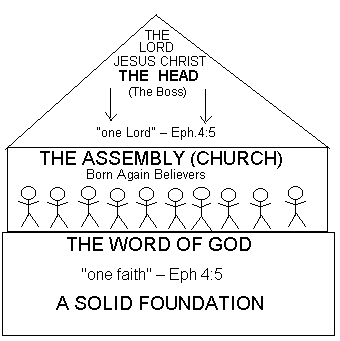
In the 1500's Martin Luther and others were involved in an important movement,
the Protestant Reformation, which sought to bring the Church back to the truths
that are taught in the Bible.
How did the Church get so far away from what the Bible teaches? Consider the following:
On the day of Pentecost the Church was born (see Chapter 9)! When the Church first began, it was under the Headship of Christ and it was built upon a very solid foundation:

As years passed, the Church began to move away from its firm foundation. People began to listen to the words of men, instead of listening only to Godís Word, the Bible. Instead of following the Leadership and Headship of Christ, they began to follow human religious leaders. Some people claimed to be Christians who were not Christians at all (2 Timothy 2:19). Some were baptized who were not even saved! As a result, there was a terrible mixture in the Church. That which was false and worldly was mixed in with that which was true and godly:
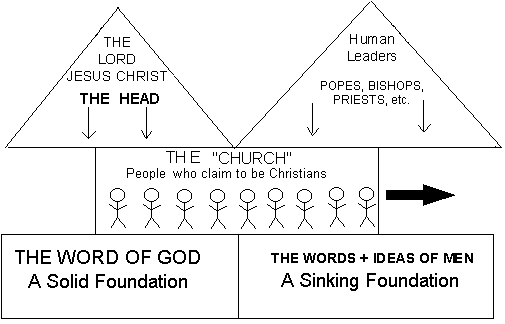
As time went on, things continued to get worse and worse. Men soon turned away their ears from the _____________ (2 Timothy 4:4) and they began to listen to false teaching or doctrines of demons (1 Timothy 4:1). Religious people did not want to believe the Bible and stand fully upon it. These religious people did not want God to be their Head or their King or their Leader (see Chapter 6). They wanted to be ruled and led by men (sinful men!). Thus the Church continued to move away from Christ and the Bible, and this resulted in a false religious system based on man's thoughts and subject to man's leadership. During this time true born again believers were few and far between:
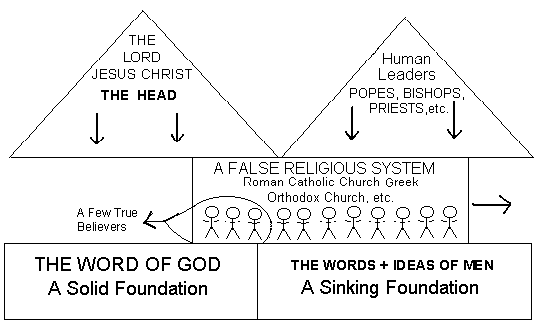
Men refused to let the light shine from Godís Word (2 Peter 1:19), and this is why the Dark Ages (476-1000 A.D.) were so dark! A few believers here and there let their lights shine, but in general these were centuries of great spiritual darkness and ignorance.
Would God let this darkness continue? In the 16th century (almost 500 years ago) the Lord worked in the heart of a German man by the name of Martin Luther. God taught this man from His Word, and Luther began to see that what the Bible taught was very different from what the Roman Catholic Church taught.
One area where Luther strongly disagreed with the Catholic Church concerned indulgences. The Catholic Church put a great emphasis on sin and its punishment in purgatory and hell. Purgatory, according to the Roman Catholic Church, is a place where those who are to enter heaven are assigned, usually for a long period of time. In purgatory the person is cleansed by fire before he is fit to enter heaven (this would involve pain and suffering). The more faithfully the person would follow his Catholic religion in this life, the shorter would be his time of suffering in purgatory. Some of the things a person could do to shorten his time of suffering in purgatory would be to pray certain prayers, to fast (go without meals), to give money to the poor, to go on a pilgrimage to some shrine, etc.
Remember, the Bible does not teach these things about purgatory. Purgatory is not even mentioned in the Bible. Believers are completely cleansed in this life by the precious blood of Christ which He shed when He died as our Substitute on Calvary's cross. We can rest in His finished work and believe that He did it all! We cannot do anything to purge (cleanse) our sins, but when Christ died on the cross He made it possible for all of our sins to be completely P________________ (see Hebrews 1:3).
Back to our subject of indulgences: The Catholic Church devised a plan by which they could make money and also make people think that they were going to suffer less in purgatory. People could buy a ticket (called an "indulgence") which would allow them to suffer less time in purgatory. Not only could a person buy indulgences for himself, but he could also buy indulgences for his loved ones (relatives and friends) who had died and passed into purgatory. In this way they could shorten the time these loved ones would otherwise have to spend in purgatory, the place of cleansing and suffering. As you can imagine, this was a huge money making program for the Catholic Church.
Some people preferred to buy indulgences rather than to constantly say prayers or do other good deeds. They thought it was easier to pay money than to spend time in prayer. There was one Catholic friar by the name of Tetzel who loved to sell indulgences. He was like a high-pressure salesman. He wanted to sell as many indulgences as he could. In his sales talk he would say things like this: "The moment you hear your money drop in the box, the soul of your mother will jump out of purgatory." The whole idea of indulgences and the wicked salesman techniques of Tetzel greatly angered Martin Luther. He knew these things did not please God.
Luther decided to write down why the selling of indulgences was wrong. He took his pen and wrote down 95 theses (statements) and then he nailed this paper to the church door of the Castle Church in Wittenberg Germany. The church door was like a bulletin board. It was where people in the town would post announcements and news. By doing this, Luther made his views about indulgences known to the public. This act of Luther was not the Reformation, but it was the first in a series of acts which were to lead up to the Reformation.
[For some of this material I am indebted to B. K. Kuiper's The Church in History, pages 158-163.]
Luther's stand for the truth and his faith in the Word of God laid the foundation for a new movement which later would be known as the Protestant Reformation (he was protesting and speaking out against the religious system of his day and seeking to reform or change the church of his day by bringing it back to Christ and the Bible):
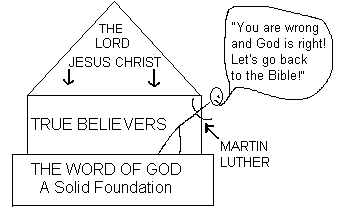
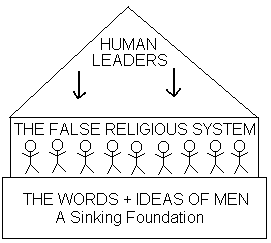
Martin Luther and others who followed him began to recover and rediscover some of the basic truths of the Bible which had been lost by the majority of people for many years and for many centuries.
The three great truths which came to light during the time of the Reformation are as follows:
Where can a person go to learn about the Lord and about spiritual things? How can a person find out about life and death, heaven and hell? How can a person discover how to be saved and how to have eternal life? Where can a person find answers about these things? Whom should he listen to? Whom should he believe? Where can he get his answers?
What books should a person read to find the answers to lifeís most important questions? Should a person get his answers from a Pastor or a Priest? Does the Pope have all the answers? Does the Roman Catholic Church have the answers? Does the Mormon Church? Does the Lutheran Church? Does any church? Should I trust tradition (that which men have believed and taught and practiced for years)?
What is my authority when it comes to spiritual things? Do you know what Martin Lutherís answer was? His authority was this: the Bible, the whole Bible and nothing but the Bible!
His authority was not in any man. His authority was God. The answers to all of lifeís important questions are found in the Bible, which is Godís holy Word. The reformation was a back to the Bible movement! There is no better way to come out of the darkness than to go back to the Bible! The constant cry of Martin Luther and others like him was this: "What S___________ THE S________________________ ?" (Romans 4:3). The reformers believed in the absolute and supreme authority of the Bible.
What is your authority? Where do you go to find the answers to lifeís most basic questions? Where do you go to find out how to be saved and go to heaven? Is God your Authority, or are sinful and fallible (capable of being wrong and mistaken) men your authority? Is your faith in what men have said or is your faith in what God has said?
How can a person be saved? How can a person be right with God for all eternity? How can a person go to heaven and escape the judgment and damnation of an eternal hell?
For years the Catholic religious system had taught that salvation was by works. They said that man must earn his salvation by doing something--by observing the sacraments, by baptism, by going to the mass, by keeping the law, by saying certain prayers, by going through a religious ritual, by trying to live a good life, etc. They thought that by their works they could somehow earn Godís favor and blessing and He would then let them enter His heaven. If they failed to get into heaven right away, then they believed that good works and buying indulgences would help them to spend less time suffering in purgatory.
Martin Luther and the other reformers realized that salvation is not by works, but it is by faith and faith alone. "Therefore, being justified by _______________" (Romans 5:1). "Not by ___________ of righteousness which we have done, but according to His ____________ He saved us" (Titus 3:5). A person is justified and saved because he puts his faith in a Person, the Lord Jesus Christ. He is the only One who can save sinners (1 Timothy 1:15; Hebrews 7:25).
Are you trusting in your own works and good deeds? Do you think that God is going to let you into His heaven because you have tried to be good? Could you ever be good enough to satisfy a holy and righteous God? We are not saved by what we do; we are saved by what Christ has already done on the cross. Read Ephesians 2:8-9 which tells how a person is really saved.
For centuries the religious system had taught that only a select group of men (called "priests") could have direct access to God. The common ordinary believer could not go directly to God; he had to go through a priest. He could not confess his sins to God directly, but instead he had to go to a priest and make "confession." He could not understand his Bible alone; he had to depend upon a priest for the correct interpretation.
Martin Luther and the other reformers realized that according to the Bible every believer is a priest (see 1 Peter 2:9 and Revelation 1:6). Every believer can go directly to God through the Lord Jesus Christ. The Bible says: "For there is one God, and one mediator between God and man" (1 Timothy 2:5). A mediator is a "go between." A mediator goes between two people. In this case, the Mediator goes between God and man. Who is this one Mediator (1 Timothy 2:5)? __________________________
What a wonderful truth! Every believer can go directly to God in prayer! Every believer can confess his sins directly to God, because He is the one we have sinned against (1 John 1:9)! Every believer can read and study the Bible for Himself, trusting God to be his teacher and his interpreter.
Are you a priest? Do you have direct access to the living God? Do you have a saving relationship with Christ so that you are able to come to the Father (John 14:6)?
Are you still in the dark, or has God revealed these three great truths to you?
"The entrance of thy words giveth light; it giveth understanding unto the simple" (Psalm 119:130).
Back to GREAT EVENTS
Back to SUNDAY SCHOOL MATERIALS & HELPFUL BIBLE STUDIES
Home Page